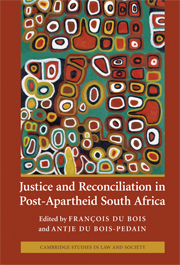Book contents
- Frontmatter
- Contents
- List of tables and figures
- List of contributors
- Acknowledgements
- List of abbreviations
- Introduction
- 1 Reconciliation as surrender: configurations of responsibility and memory
- 2 Radical forgiveness: transforming traumatic memory beyond Hannah Arendt
- 3 Communicating criminal and political responsibility in the TRC process
- 4 The contribution of criminal justice
- 5 Reparation and the forms of justice
- 6 Land restitution and reconciliation in South Africa
- 7 For justice and reconciliation to come: the TRC archive, big business and the demand for material reparations
- 8 Transition, forgiveness and citizenship: the TRC and the social construction of forgiveness
- 9 The evolving legitimacy of the South African Constitutional Court
- 10 Drawing the line: justice and the art of reconciliation
- 11 Post-conflict justice and the reconciliatory paradigm: the South African experience
- Index
- References
2 - Radical forgiveness: transforming traumatic memory beyond Hannah Arendt
Published online by Cambridge University Press: 01 July 2009
- Frontmatter
- Contents
- List of tables and figures
- List of contributors
- Acknowledgements
- List of abbreviations
- Introduction
- 1 Reconciliation as surrender: configurations of responsibility and memory
- 2 Radical forgiveness: transforming traumatic memory beyond Hannah Arendt
- 3 Communicating criminal and political responsibility in the TRC process
- 4 The contribution of criminal justice
- 5 Reparation and the forms of justice
- 6 Land restitution and reconciliation in South Africa
- 7 For justice and reconciliation to come: the TRC archive, big business and the demand for material reparations
- 8 Transition, forgiveness and citizenship: the TRC and the social construction of forgiveness
- 9 The evolving legitimacy of the South African Constitutional Court
- 10 Drawing the line: justice and the art of reconciliation
- 11 Post-conflict justice and the reconciliatory paradigm: the South African experience
- Index
- References
Summary
INTRODUCTION
‘To err is human; to forgive divine.’ So the adage goes. This folklore about the role of the divine in forgiveness may well be the conventional wisdom and defining mantra framing debates about ‘the unforgivable’ in political and social life. The magnitude of human atrocities, in other words, ‘radical evil’, places these crimes beyond the realm of human intervention – human beings can neither punish nor forgive them; they fall in the province of divine prerogative, only God may judge them. These views, however, may have to be set aside in light of the lessons learnt by our generation, a generation which has witnessed a plethora of public apologies for atrocities by world leaders, from Pope John Paul II, to Bill Clinton and to Jacques Chirac. Expressions of forgiveness by victims of some of the most egregious violations of human rights in the past century seem to gesture us to the position: To forgive is human.
The experience of South Africa's Truth and Reconciliation Commission (TRC) has been one of the most profound historical moments at the close of the twentieth century. The days, weeks and months of listening to the testimonies of victims' and survivors' pain and trauma, and of encounters with the terror, depravity and sometimes the brokenness of perpetrators of the most unimaginable crimes, confronted us more closely and deeply with the complexity of the human condition.
- Type
- Chapter
- Information
- Publisher: Cambridge University PressPrint publication year: 2009



